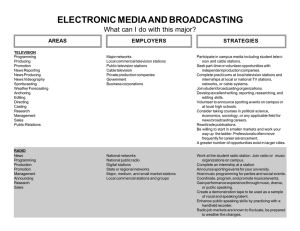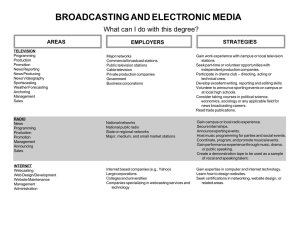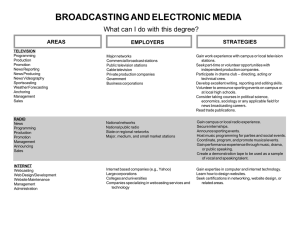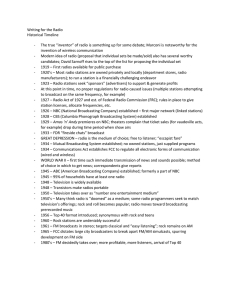ELECTRONIC MEDIA AND BROADCASTING What can I do with this degree? STRATEGIES AREAS
advertisement
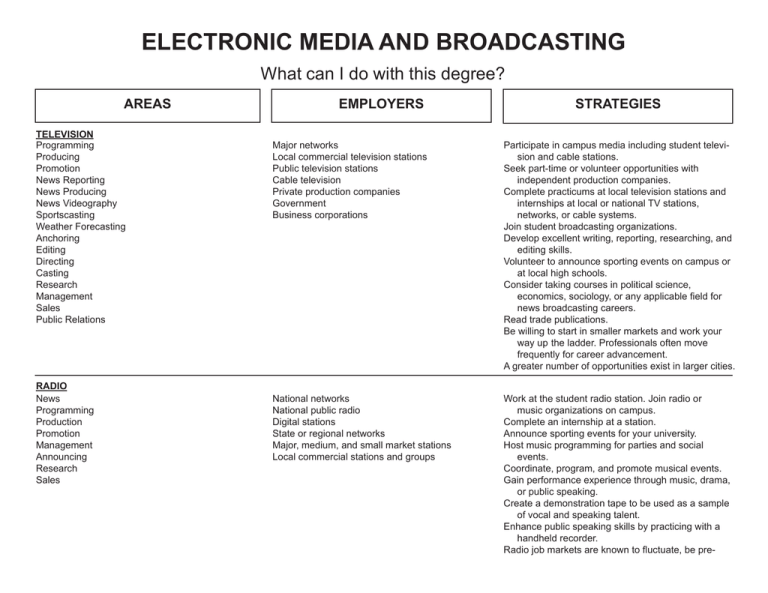
ELECTRONIC MEDIA AND BROADCASTING What can I do with this degree? AREAS TELEVISION Programming Producing Promotion News Reporting News Producing News Videography Sportscasting Weather Forecasting Anchoring Editing Directing Casting Research Management Sales Public Relations RADIO News Programming Production Promotion Management Announcing Research Sales EMPLOYERS STRATEGIES Major networks Local commercial television stations Public television stations Cable television Private production companies Government Business corporations Participate in campus media including student television and cable stations. Seek part-time or volunteer opportunities with independent production companies. Complete practicums at local television stations and internships at local or national TV stations, networks, or cable systems. Join student broadcasting organizations. Develop excellent writing, reporting, researching, and editing skills. Volunteer to announce sporting events on campus or at local high schools. Consider taking courses in political science, economics, sociology, or any applicable field for news broadcasting careers. Read trade publications. Be willing to start in smaller markets and work your way up the ladder. Professionals often move frequently for career advancement. A greater number of opportunities exist in larger cities. National networks National public radio Digital stations State or regional networks Major, medium, and small market stations Local commercial stations and groups Work at the student radio station. Join radio or music organizations on campus. Complete an internship at a station. Announce sporting events for your university. Host music programming for parties and social events. Coordinate, program, and promote musical events. Gain performance experience through music, drama, or public speaking. Create a demonstration tape to be used as a sample of vocal and speaking talent. Enhance public speaking skills by practicing with a handheld recorder. Radio job markets are known to fluctuate, be pre- (Electronic Media and Broadcasting, Page 2) AREAS INTERNET Webcasting Podcasting Web Design/Development Website Maintenance Management Administration Sales and Marketing VIDEO PRODUCTION Directing Management Production Writing Post-Production/Editing Videography SOCIAL MEDIA MANAGEMENT Strategy Content Planning Community Management Marketing and Promotions Blogging Copy Writing Search Engine Marketing Online Customer Service EMPLOYERS STRATEGIES Internet based companies, e.g., Yahoo or Google Companies specializing in webcasting services and technology Businesses in a variety of industries Colleges and universities Nonprofit organizations Gain expertise in computer and Internet technology. Learn how to design websites. Become familiar with a variety of languages and software packages on various platforms. Seek certifications in networking, website design, or related areas. Volunteer to create or maintain websites for student organizations or local nonprofits. Assist in campus webcasts if possible. Freelance or private video production companies or videographers Large corporations Universities and colleges Post-production companies Professional associations Non-profit organizations Obtain entrepreneurial knowledge and experience through starting a small business or taking business courses. Volunteer to do video editing/production for campus videographers or television stations. Gain contacts in the specific industry of interest (e.g. develop relationships with wedding photographers in order to build wedding videography business). Enter video contests. Cultivate artistic talents. Public relations firms Marketing agencies Advertising agencies Social media management companies Media outlets Corporations in a variety of industries Web application companies Freelance Get experience with social media platforms, e.g., Facebook, YouTube, and Twitter and locationbased social media sites, e.g. Yelp and Gowalla. Be adept at learning new technology and tools quickly. Stay abreast of industry news. Establish an online presence for yourself, and use it in your job search. Complete an internship in social media. Volunteer to maintain social media for campus organizations. Develop skills important to this field including: communication, creativity, relationship building, and project management. Take courses in marketing, journalism, copy writing, and technology. (Electronic Media and Broadcasting, Page 3) AREAS EMPLOYERS STRATEGIES SOCIAL MEDIA MANAGEMENT CONTINUED Research an industry of interest to learn about its social media presence. Learn how to effectively manage negative press. EDUCATION Broadcast Management Production Journalism Script Writing Mass Communications Media Arts Digital Communication Colleges and universities Technical schools Public and private high schools Obtain a PhD for college and university teaching opportunities. Obtain state teacher certification for high school teaching opportunities. You will need certification to teach additional subjects such as foreign languages, English, theater, social studies, or art. Volunteer to assist local high school students with productions. Actively participate in campus radio, television, or theatrical organizations. GENERAL INFORMATION • Internships are crucial for breaking into the field of electronic media and broadcasting. Complete several internships if possible. • Develop excellent technical and computer skills, especially internet proficiency and knowledge. • Seek opportunities for experience in any performance situation such as drama, debate, public speaking, music or athletics in order to demonstrate talent as well as ability to handle pressure. • Demonstrate curiosity, confidence, assertiveness, creativity, initiative, organizational skills, competitive spirit, enthusiasm, persistence, and diplomacy. • Display appropriate talents for public performance and appearance such as sense of humor, verbal and written communication skills, imagination, showmanship, and an outgoing personality. • Consider shadowing or informational interviewing as a means through which to gain information, develop contacts, build mentoring relationships, and gain entry into a competitive field. • Be willing to start at the bottom doing entry level tasks before moving up to larger markets or organizations. • Understand that geographic flexibility and a willingness to relocate are important in finding job opportunities. • Study all aspects of the industry and stay up-to-date through continuing education or training. Prepared by the Career Planning staff of Career Services at The University of Tennessee, Knoxville. (2003, Revised 2009) UTK is an EEO/AA/Title VI/Title IX/Section 504/ADA /ADEA Employer
